 |
 |
 |
 |
 |
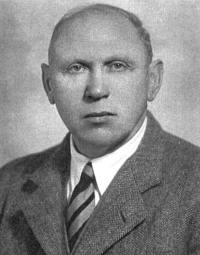 |
| Samuel Esterowicz |
Samuel began to write his memoirs in Russian in 1975. They were subsequently translated into English by his daughter and as yet remain unpublished. Although the memoirs contain a wealth of detail concerning personal, national, and international matters spanning more than 70 years, the edited extracts which follow relate to the most traumatic period in Samuel’s life – the Nazi occupation of Vilnius (June 1941 – July 1944) and the annihilation of the city’s Jewish population. Miraculously, together with his wife Ida and daughter Perela (Pearl) he survived the catastrophe that destroyed 95% of the Jews of Vilnius.
Samuel Esterowicz died on 23 January 1985 in the United States, to where he had emigrated in 1951.
Throughout these extracts, the city is referred to by the name by which Samuel knew it best – Wilno.
* * *
THE FIRST JUDENRAT
…A Judenrat was formed in the city as early as July 1941, headed by the engineer Saul Trotsky. Into it entered the Jewish representatives of the professions, the intellectuals, the middle class and the pre-war community organisations.
Concomitantly with the promulgation of the decrees directed against the Jewish population, one of Murer's first actions as Hingst's delegate was the summoning of all the members of the Judenrat to his office - it was situated on the Georgyi Prospect (Mickiewicza) in the pre World War I building of the Government Bank.
As recounted by the Judenrat members later, Murer in a brutal speech, full of unbridled hatred and contempt, demanded from the Jewish community many millions of rubles as a "contribution". Murer threatened that 5,000 Jewish heads would roll unless they delivered what he demanded. His speech, especially its unbridled brutality, was so horrifying that Saul Trotsky had a heart attack and lost his consciousness right there. To bring their unconscious chairman home the members of the Judenrat were forced to carry him in their arms for a few kilometres since Murer had forbidden them to use a carriage. Since there was no possibility of obtaining the demanded sum in cash, Murer agreed to accept the payment of the "contribution" in jewellery. I remember that both my wife and I gave our golden wedding rings and my wife's sister Vera gave her pearl necklace, a nuptial gift of her husband's.
At the time when the noose around our necks was swiftly tightening, for a long time we completely refused to believe that the Germans would be capable of the mass executions of innocent people, including women and children…
…In late August 1941 the Gestapo, led by Schweinberger, suddenly appeared at 6 Strashuna Street during a meeting of our Judenrat, seized its chairman Saul Trotsky and the sixteen other members present and sent them all to be executed…
…In Austria after the war the despicable decree of a jury which found Murer innocent was met by thundering applause and, according to eye-witnesses, Murer, the chief organizer of the bestial murder of thousands of innocent men, women and children was triumphantly carried out of the courthouse in the arms of his compatriots…
PONARY
…During the first couple of months we stubbornly refused to give credence to those few who managed to return from Ponary, declaring their tales of what was happening there as the sign of psychotic delirium - so much did it seem monstrous and impossible. When one of the two survivors of Ponary, my future son-in-law Vova Gdud (William Good) reached his home, only his parents believed him; all the neighbours thought him insane…
Vova Gdud’s testimony:
“…In the morning we were taken on trucks to Ponary, a place about 15 miles outside of Wilno, unknown at that time. Now it is infamous because 100,000 people were killed and buried there, of whom 80,000 were Jews. There are only two known survivors who escaped from Ponary alive, and I am one of them.
When we came to Ponary there was a huge mass grave excavated, ready for us. There were two machine-guns standing in front of the truck. The first thing they told us was we couldn't talk, scream or move - if there was any commotion coming out of the truck the two machine-guns would open fire.
They took us one at a time from the truck to the grave, shooting each one in the back of the head. I was standing in the truck looking at the executions - nobody said a word, nobody moved. When my turn came I got off the truck and went toward the grave like everybody else and, just a few feet before the grave, I fell. At the same time, synchronous with my falling, the Lithuanian executioner shot at me with his handgun. I happened to fall, but not as a consequence of his shooting - I just fell and he fired in the same second. He believed that he had shot me and that was the reason for my falling.
There was not a scratch on me, but he did not question this. The next victim they killed just about where I was. [He] fell on top of me and soaked me with his blood. They brought all the trucks, took off everybody (maybe 30 people to each truck) and killed all the people from the Bernardynka Park. After everything was finished the machine-guns sprayed the bodies in and around the grave because not everybody was quite dead, a lot of people were still moaning. There was a lot of shooting for several minutes. I don't know what happened to me at that time. I have no exact recollection of when the shooting stopped - I have a blank, I may have passed out.
When I opened my eyes, saw nothing, moved my head and saw nobody around, I got up and started to walk toward the gate where we had entered, because the place was fenced with barbed wire. There were two guards at the gate who saw me and one of them took a shot at me, but it was hilly terrain, so I dropped down and he did not hit me. I ran back to the grave which was next to the barbed wire. That was the most horrible moment of my life - here I was, young and healthy but terrified because I couldn't get out. It was daytime and if I would try to climb over the barbed wire the guard would probably see me from far away and shoot me. My only chance of getting out was to dig under the barbed wire. I dug with my bare hands, scared that if I was not fast enough they would catch me. That was the most terrible, the worst moment of my life. I don't know how long it took me, but I squeezed through and ran away.
I was all bloody and in tatters from the barbed wire. On the road I stumbled into the hut of a Polish peasant I did not know and told them my story; they were kind to me. I washed up, they gave me some clothes and I went home.
None of the Jews who lived in our apartment building believed me when I told my story - they said I was crazy, I must have had a nervous break-down after having my friend killed on the way to Minsk. My father believed my story and he said: 'They are out to kill us all - we are not going to the ghetto (there was talk about that), we are not going to let them lock us up, we are getting out!'
We packed up, we took some money with us and my father hid some money and Swiss watches in the attic of the house we lived in - this turned out an important factor later…”
…One should note that in our case this procrastination was deadly - before we got oriented to what was going on in reality, our enemies had time to annihilate a large part of those who would have been able to put up some resistance. On the pretext that they needed workers they were able to send to their death a large part of the physically able Jewish population. To begin with, to weaken the elements of the Jewish community who might offer resistance, these murderous initial "aktzyas" were directed exclusively against men…
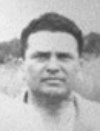 |
| Sasha Mintz |
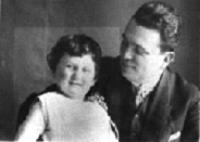 |
| Sasha and Daughter "Shela" |
The "khapuny" (grabbers), as the Jewish population had nicknamed them, took to their death tens of thousands of Jewish men, among them my brother Yefim, Sasha Mintz, the husband of my sister Anya, my cousin Kola and many of our friends and acquaintances.
The executions of the Jews, usually in large groups, were performed by a special task force of Lithuanians, the so-called "Ypatinga", led by a member of the Gestapo - in the beginning Goring was the Gestapo man in charge of the killings, then in succession the chief murderers were Schweinberger, Martin Weiss and finally Kittel…
THE GHETTOS
…By squeezing into the few streets the Jewish population of many tens of thousands ( where previously had lived in crowded conditions about 8,000 of the Jewish poor) - even though from some quarters of the city the Germans did not take the Jews to the ghetto, but rather to Ponary for general execution - the Germans created an unimaginable congestion. The number of people who lived in our modest size, narrow, elongated room of about 2 by 8 metres grew to 26 by evening.
The following nights we had to sleep huddled on the dirty floor, some lying down, some sitting, since there was not enough space for everybody to stretch out.
All the outlets of the streets connecting the ghetto with the rest of the world (with the exception of the Rudnicki Street outlet where a gate was placed) were blocked by tall brick walls. The Germans placed a placard on the gate bearing a large warning to the rest of the population about "DANGER OF CONTAGION" - "SEUCHENGEFAHR".
I remember that the horror of the inhuman conditions in the ghetto were made more bearable by my hope that here at last the Germans would let us be, that finally here our lives would at least be safe. But as we will see I was cruelly mistaken in this too…
YAKOV GENS
…Officially Gens was nominated by the Judenrat, the surviving members of which were reorganized in the ghetto under the chairmanship of Anatol Fried, the former director of the community bank. However, the fact that Yakov Gens, a man completely unknown in our city could immediately push the Judenrat aside, usurping all the power in the ghetto, points out clearly that Gens was leveraged into this position by our mortal enemies who needed him for the purpose of achieving our annihilation - after all they had prepared for Gens’ installation by the execution of almost the whole Judenrat headed by Saul Trotsky.
These facts and many others which we will soon see should preclude any doubts about the fatal role that Yakov Gens played in our tragedy; nevertheless, I have to admit that there is no unanimity among the survivors of the Hitlerian cataclysm about Gens' role…
…After every succeeding bloody "Aktzya" the Germans would assure us through their mouthpiece, Yakov Gens (in whom they had found an eager executor of their plans) that we were needed by the German military machine as workers. As far as I am concerned, and I had the possibility of observing personally the activities of Yakov Gens in the ghetto of Wilno, there can be no doubt that he was performing a treacherous job according to the instructions and the plans of the Gestapo, whose goal was our complete annihilation. I will also add that, even if in the evaluation of Gens' activity we take into consideration the fact that he probably had been constrained into doing his treacherous job, this mitigating circumstance is completely offset by the disgraceful methods which Gens had so shamelessly employed.
Having been placed as our leader by our cruel enemies during the terrible epoch when all around us was destroyed, Gens never inspired the ghetto dwellers to heroism and acts of self-sacrifice. To the contrary, Yakov Gens brought with him a poisoned atmosphere of moral decay, of shameless favouritism and - what was even worse - of treachery, in which one Jew would push another to his death to save his own hide; we find this in the disgraceful behaviour of the Jewish Police, which acted on Gens' command. Eagerly carrying out the Gestapo's instructions, Gens was on the one hand applying the "divide and conquer" rule, suppressing any attempt at organized resistance; on the other hand, by constantly assuring us that the ghetto would continue to exist, Gens was stretching out to us the "straw" for which we, the drowning, would eagerly reach and thus silently endure another of the sequential bloodlettings.
The moral countenance of Yakov Gens can also be discerned by the fact that he surrounded himself with a plethora of mistresses of great beauty, whom he would reward with the lives of their families. I know as a fact that, upon Gens' request, during the “aktzya” of "yellow life certificates", the Gestapo agent Martin Weiss (who took over from Schweinberger the role of our chief executioner) wrote on the certificate of one of Gens' mistresses "valid also for the mother". This gave the woman a chance, as an exception, to take her aged mother through the gate and thus save her life for the time being.
This fact reveals not only the close cooperation between Gens and the Gestapo, but also that the latter gave Gens a significant freedom of action. The above is corroborated in all its implications by the following: during the three years of the ghetto's existence, through the endeavours of Gens, none of the many "aktzyes" had ever touched the ghetto policemen or their families - including, in some instances known to me, even their grandmothers…
…There can be no doubt that the Gestapo realized that, in order for Gens to successfully carry out his mission of sending us to our deaths while keeping us submissive and non-resisting, it was indispensable to keep us in the dark as to his real function... It was also essential to strengthen Gens' authority and make the doomed trust him, giving him a chance to play the role of the leader who was endeavouring to save at least a small part of the ghetto population. For these reasons the Gestapo permitted Gens (as long as it did not disturb the accomplishment of their ultimate plans) to organize the life of the ghetto with the assistance of the Judenrat and even in some cases play the role of the rescuer when, upon Gens' plea the Gestapo would release imprisoned Jews.
The news that Gens succeeded in grasping someone from the claws of death would spread through the ghetto with lightning speed. It naturally fell on fertile soil; after the almighty Jehovah continued to be deaf to our pleas and pitiless toward our sufferings, there was an immense need to find a saviour in Gens…
…The difference of opinions among the survivors in the evaluation of the personality and deeds of Yakov Gens is based, I believe, on the circumstance that Gens' defenders do not take into consideration the fact that in the Gestapo we had a merciless and malignant enemy who came armed with a previously worked out, detailed plan of psychological attack which would turn us into a helpless mass.
I personally do not belong to those of the survivors who, looking back, do not see Gens as he was in reality, but rather as we all in the beginning so passionately desired him to be: a leader who was doing his best to save at least some of us. I came to the conclusion (as did many others) that Gens was a man stripped of any moral standards long before his treacherous role became obvious to most of us.
Faced with the demand of the Germans to furnish them with victims, without hesitation Gens seized the right given to nobody - to decide who of us should stay alive and who should die and then to deliver the victims to the executioners.
In similar circumstances the head of the Warsaw Ghetto, engineer Adam Czerniakow, faced with a task unthinkable to any decent person, committed suicide.
But that was not all: Gens faced us with the fact that both he and the surrounding ruling clique (mostly Lithuanian Jews from the Kowno area), including the police and his mistresses, were exonerated from the duty of contributing their blood to our horrible sacrifices as we all had to do. While taking away our mothers - supposedly in the name of saving the young - they shamelessly protected their own mothers…
REACTIONS OF GENTILES
… The memory of an event which opened my eyes to the full horror of our situation is connected with the liquidation of the second ghetto…
…In front of the windows of our workshop the Lithuanian police were driving a multitude of Jews from the second ghetto - men, women and children - down the street to the Lukiszki prison. In the passing crowd I recognized some of my acquaintances. The scene of these innocent people, my fellow Jews, being driven to their death shocked me to the depth of my soul. This became even more poignant when I realized that the Polish workers in the workshop looked at this horrible injustice not with sorrow but with yells of joy and satisfaction. "Look", they were jumping for joy, "the Jews are taken to be killed"…
…However, if the matter did not concern Jews as a whole but a Jewish friend or neighbour, the Poles in many cases manifested a humanitarian and disinterested desire to help, even though this assistance involved great risk, in many cases even risk to their lives. I would also like to mention that in contrast to the Poles and the Lithuanians, the older generation of Byelorussian peasants, less influenced by the hateful propaganda of the Polish chauvinists, did not hate the Jews and frequently expressed sympathy for us. The fact that the Byelorussian peasants refused to charge the Jewish HKP workers for their food (as they charged everybody else) when the latter, together with the Gentile workers were sent out of town to the forest to load lumber for the heating of our workshop, was characteristic of their attitude toward the Jews.
I encountered some such exceptions i.e. Gentiles who were not infected with the burning Nazi anti-Semitism even among the Germans. Although subjected to the hate-mongering propaganda of Goebbels and the "Stürmer", they were openly indignant about the horrors committed against the Jews. One of the above was a German soldier named Berger who had been assigned to our automobile repair workshop and with whom I became friendly. A common worker from Chemnitz in Saxony, once a centre of the German textile industry, Berger exclaimed while watching the Jews being driven to their deaths:
"Was diese Lumpen im Namen des Deutschen Volkes hier treiben - Jahrhunderte werden wir uns nicht reinwaschen können." (“What this scum perpetrate here in the name of the German nation - centuries will not suffice for us to cleanse ourselves!”)
The same Berger, upon returning from home-leave related an occurrence which demonstrated that the Nazi government hid the truth from the broad masses of their population. Hearing about the horrors committed by her fellow Germans in Lithuania, Berger's wife at first decided that he must have lost his mind - his tales seemed so monstrous and improbable…
THE GELBSCHEIN-AKTIONEN
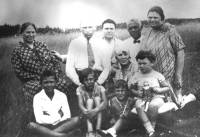 |
| The Esterowicz Family |
…After my wife and I returned with sinking hearts to the ghetto, we learned that from our room the Germans took to their deaths my Mother, my wife's Mother and Aunt Sara; nevertheless, when we found that, beyond my expectations, my sisters Emma and Anya with her daughter Shela, as also Vera and Naum Zlatin managed to hide and survive - I must admit that I did not cry for my Mother. The fact that on that evening the news of the murder of my own Mother was not the worst possible disaster for me gives some slight inkling about the mental torments to which we were subjected…
…On the third day after the "aktzye" we encountered the first of Yakov Gens' bloody "mistakes", resulting in the death of two thousand Jews. Gens made a speech in the yard of the Judenrat to a crowd of helpless "illegals", trembling in fear for their lives; in his speech he called upon them to resettle in the second ghetto, by that time purged of its inhabitants, where Gens assured them they could live peacefully. However, before those who had listened to Gens had even come near to the second ghetto, they were surrounded by Germans and Lithuanians and sent to be shot in Ponary. "The Gestapo has deceived me," was Gens' excuse and we believed him, since the character of his activities was not yet clear to most of us.
We should take note that by that time the following occurrence forced our Gentile friends to think twice before they gave shelter to the Jews: shortly before the "yellow life certificate aktzye", Franz Murer came to the ghetto gate and summoned my childhood friend Victor Chelem.
Victor and his sister Eugenia, the heirs of Isaac Chelem, were owners of a wholesale glass business and sizable real estate in the commercial centre on Niemiecka Street and were thought to have become very rich after World War I.
Murer demanded that Victor give up to him the gold that he had hidden outside of the ghetto. Nothing would happen to Victor if he complied, Murer said, but if he refused he would be shot immediately. Victor could do nothing else but take Murer to his former apartment house and ask the caretaker, Nikolay Ordu, to give the gold to Murer. Murer kept his word and released Victor Chelem - but he ordered Nikolay Ordu hanged. The body of Nikolay Ordu hung in Cathedral Square with a board fastened to him announcing that this was what awaited all those who hid Jewish property or who gave shelter to the Jews…
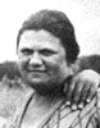 |
| Emma Eisurowicz |
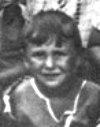 |
| Anya Mintz |
 |
| Shelinka Mintz |
In our workshop I met a German soldier who, for some remuneration, delivered my sisters and Shelinka to Woronowo in an armoured car. My sister Emma must have had a foreboding of a sad fate awaiting them, for she was sobbing bitterly as she was stepping into the car. To my great sorrow, Emma's forebodings turned out to be terrifyingly correct…
…The Lithuanian police came to Woronowo and arrested all the Jewish refugees from Wilno, Emma, Anya and Shelinka among them, two weeks after their arrival. After keeping them locked in the building of the local cinema for 24 hours, the Lithuanian police shot all of them, numbering about 300 people, on 15 November 1941. Thus perished my sister Emma, a person of exceptional moral values and strength, in the 49th year of her life. Emma's death was the culminating point of a life which knew no limits to sacrifice and to love…
…Dissatisfied with the insufficient amount of victims of the 24 October killings, the German authorities decided on a second "aktzye". This time those who possessed the "yellow life certificates" and their families were supposed to leave Ghetto Number One on 3 November, and for a couple of days go to stay in Ghetto Number Two, which by that time had already been emptied of its inhabitants.
On this occasion Yakov Gens was checking the "life certificates" at the gate. Looking back I would like to emphasize that, hunting with a cudgel in his hand for the "illegals" and condemning them to death, Gens in no way resembled the leader who, with pain in his heart, sacrificed a few in order to save many of the people entrusted to him - as he is described by some of our historians.
We were able to save, by taking her out to the second ghetto as our second daughter, a nineteen year-old girl from Kowno named Yocheved Shadowska, who lived in our room. To look younger, Yocheved braided her hair and put on a shorter dress.
The lifeless streets of the second ghetto were horrifying - the room we entered was deathly quiet; there was an unfinished meal on the plates placed on a table. The opened prayer books and prayer shawls spoke about a suddenly interrupted life, about people who were caught unawares when taken to their deaths. Sorrow and the burning feelings of indignation for the murder of innocent people which I experienced then for my fellow Jews is especially deeply graven in my memory.
The victims of the two "yellow certificates aktzyes" numbered more than 6,000, and from since just 1 October 1941, the Jewish community had lost more than 20,000 people. Destiny knew no pity for me in that period - I lost seven members of my closest family - my Mother, both Sisters, my Mother-in-law, two Nieces and a Sister-in-law. The news of the tragic events of Woronowo threw me into a deep depression, I remember. Strangely enough it was my fear for the lives of my daughter, my wife and myself that made me hold on to my strength in those days…
NIEMENCZYN
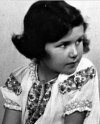 |
| Perela in ~1935 |
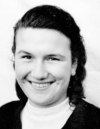 |
| Perela in 1945 |
Nobody believed him.
They took the 700 people and they marched them on the road to Wilno and for every three Jews there was one Lithuanian shooter. For the three here there is a Lithuanian on the right side, for the next three there is a Lithuanian on the left side, for the next three on the right side again - there were lots of executioners. They were walking on the main road and about six or seven kilometres out of town they told them to march into the forest - there was a meadow between two huge forests. They made a right turn - it was obvious that they were not going to Wilno.
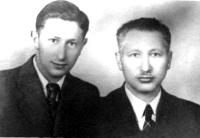 |
| Wowka and Dov Gdud |
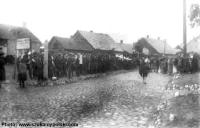 |
| Niemenczyn * |
There was shooting going on, he was running, there was another man running after him and then he hears a woman's voice calling 'Mr. Gdud, wait!' He looked back and it was the pharmacist's wife, Esther Bernstein. He called to her: 'Esther, run, run, run for your life, run after me!' She ran after him and they ran away into the woods. I heard all this from my father when I joined him three months later…”
…Looking back at the Niemenczyn massacre, as related by my son-in-law, it appears that the Lithuanians, (strangers in these parts, whose local population consisted of Byelorussians, and Jews) perpetrated the murder of the Niemenczyn Jews on their own - the Germans did not have to take part in the massacre.
It is not known to me whether the Lithuanians committed their criminal deeds in Niemenczyn upon the command of Germans, but in many cases known to me they killed innocent and peaceful Jews with bestial cruelty on their own initiative. The infamous Lithuanian "Ypatinga", which carried out all the executions in Ponary, consisted entirely of volunteers. My son-in-law and his father survived with the active help of the Byelorussian peasants. They were imperilled by the Polish partisans, members of the "A.K.", who were no less eager to exterminate the Jews than were the German Nazis and the Lithuanians…
LIFE IN THE GHETTO AFTER THE GELBSCHEIN-AKTIONEN
…The murder of the innocent inmates of the Wilno Ghetto did not halt after the "aktzyes" of the yellow life permits. There were two more bloody "aktzyes" before the end of 1941.
The first, during which about 500 people perished, was directed against the family members of the Jewish manual workers of the Gestapo, who during the previous "aktzyes" had been permitted to retain their brothers, sisters and parents. The second, the so-called ' "aktzye" of the pink certificates’ (to which about 400 people fell victim) was directed against the "illegal" inhabitants of the ghetto and took place before Christmas of 1941. The family members of those possessing the yellow life permits did not have to leave the ghetto this time, they were given pink certificates instead…
…Even though our housing conditions were somewhat better, since after the bloody "aktzyes" the number of the inhabitants of our room was very much reduced, we still, as before, had to sleep on the floor and were forced to contend with hunger, lice and cold. The food rations determined for us by the Germans (half of the rations given to the Gentiles) were completely inadequate for people who had to do heavy labour 12 hours a day, six days a week, but even those we had to share with the "illegals". The Jews working in the German institutions outside of the ghetto were able to purchase some food-stuffs by bartering their clothes and underwear, or by paying cash for their purchases. Gentile traders were waiting for us at our places of work, foreseeing that they could charge us high prices. Returning from work to the ghetto, we would contrive (at the risk of our lives) to smuggle the food in - some for our families, some to sell.
This trickle of food into the ghetto was fiercely prohibited by the Germans, since it apparently counteracted their plans for starving to death the non-working population of the ghetto. On the order and under the observation of the Germans - frequently checked by Franz Murer himself - the Jewish police would scrupulously search the returning workers and cruelly beat those trying to smuggle in food. In some cases Murer, who was particularly zealous in the fight against the prohibited bringing of food into the ghetto, would send the offenders to the Gestapo, from where they never returned; such was the fate of the singer Luba Levitska, the brother-in-law of Bundist Kagan, Vergili, Stupel and others.
The news that Murer was at the gate as we were returning, was for us very bad news indeed. Our group was twice searched by Murer personally as we were marching down Zawalna Street on the way to the ghetto. I managed to let the food carried by me fall into the snow before Murer, pushing his finger into my chest, asked: "Und Sie?" (“And you?”)
Nevertheless, the trickle of food brought in by thousands of those working outside of the ghetto was not the only way that provisions were supplied. By bribing the Lithuanian guards, the Judenrat succeeded in systematically bringing in food by the cartload. Moreover, a whole new class of traders evolved in the ghetto; most successful of these were those chimney sweeps who worked in the city. My young former employee, Aaron Kagan and his brother Jasha were among these chimney-sweep entrepreneurs. They provided the ghetto with all the necessities, by carrying them over the roofs and through incompletely blocked openings between attics. Accordingly, everything could be bought in the ghetto; the question of adequate nutrition was dependant on one’s possession of money. The Soviet currency - 10 rubles to one German Mark, continued to circulate in the occupied lands…
…The department of Social Help of the Judenrat, headed by my friend, attorney Srolowicz, cared about food for the needy. The Judenrat income consisted of taxes, rent, special fees and contributions (I gave them more than once). Additionally, motivated by the urgent need for money to feed the needy and bribe the representatives of the authorities, the Jewish criminal police would search private dwellings and confiscate the discovered gold and jewels. Thus, to the best of my knowledge, we had no deaths from starvation during all the time the Wilno Ghetto existed - in contrast to the Warsaw Ghetto, in whose streets one could everyday find bodies of people dead from starvation…
…The Judenrat took advantage of this short interruption in the realization of the Nazi plans for the "Final Solution of the Jewish Question" to organize life in the ghetto. There were the measures of hygiene, the provision for the inhabitants of the ghetto with medical help and food, the feeding of the needy. In addition I should first of all mention the care for the ghetto children, the vast majority of them orphans. The children received a supplementary food ration. Together with the creation of shelters and orphanages, directed with immense self-abnegation by Dr Szabad-Gawronska, schools were also opened with Yiddish as the teaching language. There was also a school of music and piano playing headed by Tamara Abramowna Gerszowicz. The books of the Matias Straszun library were greatly treasured and utilized at that time. Chaykel Lunski, the librarian, was spared by the Germans as long as the ghetto existed. That was the time in which there were performances of the ghetto symphonic orchestra conducted by the composer Durmashkin; the choir performed Jewish folk-songs under the direction of Abram Slep. A Yiddish theatre was created, largely due to the drive and endeavours of the chief of police, Yakov Gens, and of his assistant, Josef Glasman. A series of concerts was organized. Some of the songs performed had been composed in the ghetto. The performers Abram Bergolski, a newcomer from Russia, and Chayele Rosenthal, a native of Wilno, were especially popular. We personally, grieving about the loss of those dear to us, did not attend any performances in the ghetto. [Samuel’s daughter Perela recalled: "Father said: "You don't go dancing in the cemetery.”’]…
HKP 562 AND THE LIQUIDATION OF THE GHETTO
…I worked as stockroom keeper in the vehicle repair shop situated on Wilenska 23. This repair shop was incorporated into the military vehicle repair system - the Heeres-Kraftfahr-Park - the HKP 562, which was headed by the German army Major Plagge and whose main workshops were situated in the Technical School built by the Poles on Antokol. Subsequently, this circumstance made our survival possible…
…The work in the HKP workshops secured the obtaining of the vital "Facharbeiterschein" - the qualified worker's certificate. We worked six days a week, from six in the morning until six in the evening with a half-hour interruption, during which we received a portion of soup which was brought from the central workshop situated in the building of the Technical school in Antokol. In addition to this, the fact of leaving the ghetto and the contact with the gentile population gave us a chance, (by selling some pieces of clothing and linen) of acquiring food which we then endeavoured to bring into the ghetto for our families - a perilous undertaking…
…At the beginning of October 1941, at the same time as the Jews were ordered to give up to the Germans all of their fur garments, some workshops were transferred out of the ghetto to the buildings which used to house the radio receiver factory "Elektryt". The workers of these workshops and their families - about one thousand people - moved out of the ghetto, thus creating a separate, more privileged work camp named "Kailis". The "Kailis" workers were untouched by the "Yellow Life Certificates aktzyes” and were allowed to retain all the members of their families…
…The liquidation of our ghetto actually began at the beginning of August 1943, when the Germans had arrested some crews returning from work to the ghetto and loaded them into a railroad transport which they were told would take them to Vaivary, a work camp in Estonia. We were slightly calmed by the fact that, in contrast to the former practice in which people supposedly taken to work were actually ending in Ponary, this time letters arrived in the ghetto from which we learned that Vaivary was not a myth, it actually existed. After a couple weeks this was repeated. A few hundred people returning from work were again caught by the Germans and sent to Vaivary. Even though the percentage of people working for the Germans was continually growing (by now even our thirteen year-old Perela was working, sorting and cleaning German army coats), we knew that the catastrophe was near…
…David came back after seeing Gens late at night and informed us that he learned from the latter that the Gestapo chief Neugebauer demanded 2,000 women from Gens - thus next day there would be an “aktzye” against women…
…When we came into the yard of Rudnicka 4 on the morning of 4 September, we heard Gens addressing a crowd from the balcony with the following speech:
"Fellow Jews, I managed to obtain the permission of the Gestapo for the wives and children of those deported to Vaivary to join their husbands and fathers!"
With this treacherous trick, Gens managed to lure 1,300 women and children who believed him into volunteering to go to Vaivary. After hunting all day in the ghetto, Kittel and the Jewish police managed to seize the lacking 700 victims and force them onto the transport.
The treachery of Gens is made even more horrible by the fact we learned after our liberation - the transport of the women and children was not sent to their husbands but to the gas-chambers of one of the camps in Poland. According to Mrs Shapiro, who had been on that transport with her child, their train turned around immediately after their arrival in Vaivary and went in the opposite direction. She managed to jump out of the railroad car at the Eidkunen station in East Prussia and had thus survived.
As a defence of Gens' shameful deeds one often hears the argument that if not he but the Germans had carried out the "aktzyes", it would have been worse. I ask: worse for whom? Certainly not for the many thousands who Gens and the police acting on his orders sent to their deaths. In this case worse off could be only those who, by pushing others to their deaths, had hoped to save their own lives, a hope in which they turned out to be cruelly wrong…
…Into the ensuing dismal days filled with fear for our lives there came a sudden ray of hope: tidings came to the ghetto that Major Plagge, the chief of HKP 562, had succeeded, after lots of requests (he even had to go to Berlin to achieve this) to contrive a work camp for the Jews working in his establishment. The authorities designated for this camp the buildings of the so-called "cheap housing" on Subocz Street. They had been built during the times of the Czar by the Jewish Colonizing Society, financed by the Jewish philanthropist, Baron Hirsh…
…On 16 September 1943 we left the ghetto and went to live in the camp provided for his Jewish workers through the endeavours of Major Plagge.
The work camp HKP to which we had moved, consisted of two long, stone, three-story buildings, in which were located both the workshops and the dwellings of the workers; it was standing in the midst of a large empty parcel of land. We were separated from the rest of the world by walls of barbed wire which were patrolled by the Lithuanian police. The entrance gate of the camp was located on Subocz street and the back bordered the Rossa outskirts of town. We settled in a room on the first floor of a separate, lower wing of the right-hand building…
…Our camp, as well as "Kailis", was under the administration of and subjected to the Nazi SS, embodied by a long-necked German whom we had nick-named "Golosheyka" (little bare neck)… As was mentioned by me before, it was thanks to the endeavours of Major Plagge, who was guided by his desire to protect his Jewish workers, that the dwellers of HKP, numbering over 1,000, were able to avoid, at least temporarily, the fate of those Jews who remained in the ghetto. Not surprisingly, therefore, Major Plagge, our protector (who, in addition, according to those who had personal contact with him, was a man of the highest moral character - as we also ascertained later) was much beloved and respected by us.
The sympathy toward us of Major Plagge had put its stamp not only on our working conditions but on the whole way we lived. Personally I worked not too laboriously as the stockroom keeper of the workshop for vehicle seat-repair. We worked from 6 a.m. to 6 p.m. with a one hour interruption for dinner, which I ate in our room with my family. In the room which we shared with the people with whom we had arranged to live, and in which there was running water and a kitchen stove, we slept in beds and were able to wash ourselves and to cook...
…The possibility of sneaking out of the camp disappeared, however, in connection with an event which reminded us again that we were living under the Sword of Damocles, and that our lives were in the hands of our implacably merciless enemies. I do not remember the exact date, but it happened before the advent of frosts, which usually comes in November...
…After all the workers had been mustered out in the yard where the Jewish police had previously (upon the command of the Germans) built a gallows, the gate suddenly opened and three Gestapo men, led by Bruno Kittel, the liquidator of the ghetto, drove in in an open car. They brought with them two fugitives from our camp they had caught - a woman nicknamed "Pozhar" (Fire) and her common law husband, a man named David Zalkind. A deathly silence reigned as the Gestapo men moved towards the gallows with the condemned, broken by the piercing cry of "Mama!" which suddenly sounded from a window on the upper floor of one of the buildings, in which we saw a child's head. Before the passing of even one minute a little girl, maybe eight or ten years old, ran out from the building and rushed with a joyous cry of "Mama" to embrace her mother (Pozhar).
We witnessed a horrible, heartrending scene - the joy of the child who thought that she had found the mother she was longing for, and the distorted-by -suffering face of the mother who was passionately embracing her child, knowing that she was walking to her death. When the whole group arrived at the place of execution, Kittel motioned with his hand for Grisha Shneider, the camp's blacksmith to step forward from our lines and ordered him to be the executioner. However, when the man (whom they were hanging first) fell twice because the noose tore, Kittel ordered him to kneel down and killed him by a shot in the back of his head. Afterwards, while he was killing the woman one of the other Gestapo men killed the child.
The Gestapo was not satisfied with this, however. Having decided to shoot 36 women as a punishment to forestall any more flights from the camp, next morning, after the men had gone to work, the Gestapo ordered the Jewish police to chase all the women and children out of the rooms onto the huge yard adjacent to the buildings…
…When I happened to walk out of the workshop I saw the following picture: in the yard stood a huge black van with our German driver Beck at the wheel. On the lot behind the building were hemmed in a few hundred women and children, my wife and daughter among them, whom the Lithuanian police were dragging to the black van and pushing in. When, without hesitation, I rushed to my wife and daughter, a Lithuanian policeman grabbed me and started to drag me towards the black van. I broke away from him and ran towards my family. By the time I had run into the yard the Lithuanians had stopped the "aktzye", having taken the appointed number of victims.
Immediately afterward the black van left the camp without any guards, with just Beck as driver. We later learned that on the way to Ponary the condemned succeeded in opening the door which was located in the back of the van and, disregarding the consequences, started to jump out of the van. The results were quite serious for some, since Beck was driving very fast and they broke their legs jumping out of the speeding vehicle. Some of the women (from whom we learned all this) did manage to come back to the camp.
The chief of HKP 562, Major Plagge, came to encourage us after these events. Obviously embarrassed about the latest "achievements of his fellow Germans", he told us, among other things:
"Regrettably, the war has destroyed moral values as well as the material ones."…
…On 27 March 1944, in the early morning, after the men had left for their work places, the gates of the camp were suddenly opened and into the yard of our camp drove trucks carrying a large contingent of officials of the Gestapo and of the Lithuanian police, led by Martin Weiss, an executioner, the hands of whom were already crimson with the blood of many tens of thousands of the inmates of the Wilno Ghetto.
The new arrivals scattered swiftly over the dwellings from which they began dragging out children and teenagers up to the age of fifteen, as well as even those few elderly who managed to get to our camp. Those captured they took to the trucks, into which they pushed their prey. Heartrending scenes took place in our camp when the sobbing children vainly looked to their parents for protection. Mrs Zhukowski, the mother of the boy whom Kittel, amazed by his beauty, sent with his mother to our camp from Ponary, was killed by Martin Weiss with a shot from his revolver, after Mrs Zhukowski had called him "murderer". I saw with my own eyes the Lithuanians wrenching by brute force his talented daughter from the arms of Beniakonski. She had enchanted us just the day before. In some cases the mothers, not wanting to abandon their children in this terrible moment, shared their children's misfortune voluntarily. The fate of the seized children was more than horrifying. As I learned after the cessation of hostilities during my stay in Italy from some Jews who had serviced the crematoria in the "Vernichtungslager" (Extermination Camp), since the gas chambers could not keep up with their task, the transports with the children were sent straight to the ovens. Our daughter avoided this horrible fate by hiding in a "maline" which our neighbour, Attorney Zmigrod began building in the cellar and which she found a few days before.
The "children's aktzye" shook the camp to its very foundations. The air was filled with the moans of the disconsolate mothers, people moved around the camp like shadows. Running into Borys Beniakonski who had lost his daughter as I recounted, I couldn't hold back a whisper: "How could one let go of such a daughter?" "Are we human", Beniakonski answered me, "we are worms, you hear, we are nothing but crushed worms!"
These words of Beniakonski aptly characterized our emotional state at that time.
The three-year-long torture by fear, the continuous chain of disasters, our enemies' merciless and boundless cruelty on the one hand, and the complete futility of resistance on the other, exhausted our spiritual forces. The majority of us were only left with the instinct common to the most primitive beings, that of self preservation. The realization that we were doomed and that the point of tragic resolution was getting near did not weaken this desire to live - if anything it rather strengthened it. If at the beginning of the Hitlerian occupation there had been some individual cases of suicide, these ceased completely when we entered the period of systematic mass extermination. As described by me before, these times bared people’s souls. In many cases mothers would sacrifice their lives to save their children or ease the children's last moments. But there were also some cases when the thirst for life made the mothers sacrifice their children to save themselves…
…Feeling that the noose around our necks was getting tighter, the men living on our landing started to work feverishly at night preparing a hiding place, the so-called “maline.” We knew from experience that if the entrance to a maline stops being a strict secret, its usefulness is zero. At the critical moment a crowd craving rescue, much larger than the capacity of the maline, would dam the entrance to it… Working diligently, we blocked off the farthest room in the basement by a brick wall and excavated an underground passage to gain access to this isolated space. For this we had to chisel a large hole through the stone foundation of the house. The shaft leading to the crawlspace we camouflaged by covering it with an earth-filled flat wooden box. We fastened wires to two sides of the box. By pulling on the wires we could raise the earth-filled box. The required materials - cement, boards and so on - we stole from the Germans. The car battery we needed for illumination we acquired by the same means… We were speedily nearing the outcome which would prove tragic for the vast majority of the camp's inmates.
As early as Saturday 1 July 1944, we were warned by Major Plagge that our camp would be evacuated westward because of the approaching Russians. To emphasize his warning, Major Plagge informed us in his speech that we would stop being a HKP work camp and would be entirely in the hands of the SS. This speech of Major Plagge aroused terrible fear in us. According to the BBC, before retreating the Germans had shot without mercy all the Jewish inmates of the camps. Thus having no illusion about the intentions of our executioners, the vast majority of us understood that for our camp the moment had come which we all feared and for which the dwellers of our landing had made feverish preparations. At dusk a few tens of men, mostly young ones, ran away from the camp, jumping out of the window of the blacksmith shop, which was facing the outside world.
Even though the day of Monday 3 July was marked for our "evacuation", we decided to begin descending into the maline without delay, especially since we had to do so very carefully so as not to give away the secret of the maline to "outsiders". The vast majority of the inmates of the camp had no prepared hiding places and hearing about the looming "evacuation", were rushing around the camp looking for any imaginable way of rescue. The dwellers of our landing, as well as the family of my wife's brother, descended to the cellar through the camouflaged hole in the asphalt floor of the cubby-hole under the stairs…
A small electrical bulb connected to the stolen car-battery barely illuminated the space where about one hundred of us lay down on the bare ground. With the coming of morning, i.e. of the moment when the Germans would discover that a few hundred people did not appear at the inspection, our tension was getting speedily worse. I remember that, fearing that the Germans would blow up the building, we began to thrust ourselves against the outside walls, assuming that this would give us a better chance to survive.
Added to the fears of discovery by the Germans or that we would perish under the ruins of the building came a sudden excruciating physical suffering. We had not appreciated the importance of, and therefore did not arrange for, sufficient ventilation; to this was added the unforeseen crowding. Thus our hiding place was rapidly becoming ever more stifling. Being faced with unavoidable death by suffocation, our leaders, Zmigrod and Mintz broke through some tiny openings in the outside walls with pickaxes (risking that this would bring us to the attention of our enemies). The scanty trickle of air thus generated saved us from suffocation but was insufficient to protect us from the effects of the severe oxygen deficiency of the air we breathed (a candle could not burn).
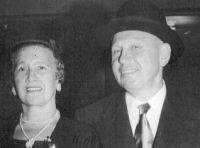 |
| Ida and Samuel Esterowicz |
This did not end the horror: with every passing moment I was more persuaded that my wife was also hallucinating. Her speech was becoming ever more irrational and pointless. I remember that my despair related to my wife's mental aberrations was deepened by the realization that if she should start to scream her life would be endangered not only by the Germans. As events demonstrated, my fears were well founded - in such an eventuality [some of those in the maline] would not have hesitated in killing my wife either.
The events in our maline had demonstrated that when people are caught in the situation of hunted animals, their lust for life (sharpened in such cases) frequently converts them into merciless killers…
…In the meantime, in the camp (as we were told later) there appeared on Monday a special German military detachment wearing black uniforms with skull head insignia on their caps. They sent all the inmates who came to the inspection to be shot at Ponary - nobody survived. Discovering that a large percentage of inmates did not appear at the inspection, the Germans started a search of both buildings and those discovered there, (numbering about 200) were shot immediately in the yard. The Germans mobilized the surrounding Gentile population for burial of the corpses, after which they lifted the guard and abandoned the camp on Tuesday 4 July. Simultaneously, the Germans liquidated in the same way the Jews of the camp "Kailis" and the group of Jews, headed by Doctor Margolis, who were working in the military hospital on Antokol. They were all shot at Ponary.
The Jewish manual workers servicing the Gestapo, headed by Kamenmacher, were sent to Kowno where they were all shot at the 9th Fort.
Through the mercy of destiny we were not discovered by the Germans and, cut off from the world, we continued our torment in our maline. I remember that we suffered from thirst most terribly and to assuage it we were forced to drink the sewer water, which we filtered by covering the neck of a bottle with a handkerchief. On Tuesday evening the scouts sent out through the crawlspace came back with the news that the Germans had lifted the guard and left our camp. After this news we decided without hesitation to break out from the maline with its inhuman conditions and nightmarish experiences and brave the dangers on the “Aryan side.”
In the meantime the following was happening: learning that the Germans had left, crowds of Gentiles inundated the camp to grab the belongings of the killed Jews. We had brought clothing, linen, dishes, pots and pans, pillows and so on from the ghetto. It all was left in the habitations - immediately all was appropriated by the mob. But the looters were not satisfied with this - after all Jews were famed for their "riches", their gold and jewellery. Thus, searching for the Jew's hidden riches, the looters started to rip up the floors and everything else they suspected could hold anything.
It was Wednesday evening when, by moving the oven in the "cooperative", they discovered the entrance to our maline. Apparently those who had left the maline the day before did not replace the oven very well. The stream of light coming suddenly from the ceiling, blinding to eyes accustomed to darkness, made us fear that the worst had happened - the Germans had discovered the entrance to our hiding place. The fact that the order to get out was made in Polish rather than in German was rather unexpected. Exhausted physically as well as psychically, we decided to submit to fate - even more so when we soon realized that we were discovered, not by Germans, but by a band of Poles.
We had to pay off the Poles who awaited us. For my part I gave them a gold pocket watch, the wedding present of my father-in-law. Learning from the Poles that the Germans and their flunkies had left the camp, we decided to leave it too. Fearing that on Subocz Street we might be faced by our persecutors we turned toward Rossa where our camp adjoined a wood. On our way we passed the incompletely buried corpses of those whose hiding places had been discovered by the Germans and who were shot on the spot…
…The first patrol of the Red Army appeared in the yard of our bomb shelter on the morning of 12 July 1944; it consisted mostly of Kalmyks. Their coming proclaimed the end of the three years of our torment.
Thinking back I remember that having been crushed by the ceaseless flood of disasters, we were utterly drained psychologically by these years of terror as well as by our struggle to avoid our appointed destiny. Thus we were unable to react to the fact of our miraculous deliverance with the joy it deserved…
Reproduced by kind permission of the family of the late Samuel Esterowicz.
For the complete memoirs, see www.searchformajorplagge.com
Photo:
Tomek Wisniewski Collection* www.szukamypolski.com
© ARC 2005